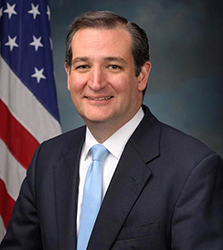
Ted Cruz’s Sophisticated Campaign, Not-So-Sophisticated Endorsers
Politico has two articles on Texas Senator Ted Cruz's presidential campaign this morning, one highlighting a sophisticated voter profiling program being used to identify likely supporters and another suggesting some of his high-profile endorsers may cause him some embarrassment.
The first reports on the Cruz campaign's use of a "psychographic" firm. For some reason the fact the company is owned in part by a Cruz donor is the focus of the story, but the really interesting part about the article is how Cruz might benefit from the services provided:
Cruz spokesman Rick Tyler said Chris Wilson, the campaign’s director of research and analytics, is using Cambridge Analytica to build models that identify and sort persuadable voters in early primary states by six key personality types, which will be used to target the campaign’s outreach.
“I’ve seen their product, and it’s better than anything I’ve ever seen,” said Tyler. “We know what a Cruz supporter looks like demographically … and this allows us to go into Iowa and match those traits with likely caucus-goers.”
The firm did similar work for a SuperPAC in 2014:
Garrett Marquis, a spokesman for Bolton’s super PAC, said the $340,000 his group paid to Cambridge Analytica in 2014 was money well spent.
“It’s something that no one has done in politics. Period,” said Marquis. “It was the most cost-effective, efficient way to reach voters. We were very pleased.”
Marquis said the firm created five categories of potential voters, including “soccer mom” and “working dads,” by layering responses to surveys atop voter data, and then targeted voters based on which category they fell in. The firm’s “core offering,” according to its website, “combines advanced data analytics and the creation of a psychographic framework to help you gain increased insight into your target voter groups.”
Ted Cruz has methodically built a roster of state leaders to help him fire up social conservatives in the South. He may have gotten more than he bargained for.
In the last month alone, three of his state co-chairs have drawn fire over comments related to everything from Sharia law to the victims of the African-American church shooting in Charleston, S.C. That dynamic was thrown into sharp relief in recent weeks, as the debate in South Carolina unfolded over whether to take down the Confederate flag from the statehouse grounds.
One state co-chair said the victims of the Charleston shooting “waited their turn to be shot.” Another has emerged as the voice of the opposition to removing the rebel flag from the statehouse, likening that effort to a “Stalinist purge.” Separately, in Tennessee, his state chairman had once accused a Muslim state appointee of being a “Shariah compliant finance expert,” a comment that sparked outrage in some corners when he was tapped for the position with Cruz in early June...
How this might play politically is an open question, but at least for the early primary process it could be a help for Cruz, according to some:
...Plenty of his deeply conservative supporters are energized by people, like Cruz’s Tennessee chair, who promise to take on Sharia law. And in South Carolina, there remains a pocket of Republican voters who do not want to see the Confederate flag come down, though it’s not clear how large that group is. Other Republican presidential candidates, who supported Gov. Nikki Haley in her call for the flag to come down, may have alienated those voters — but Cruz hasn’t.
“From his standpoint, it’s not bad politics,” said someone working for a rival campaign. “…If you look at, how do you distinguish yourself in a crowded field, in a state as important as South Carolina, that would be one way of doing it. As a long-term strategy, it may be short-sighted, but they are playing the short game.”



